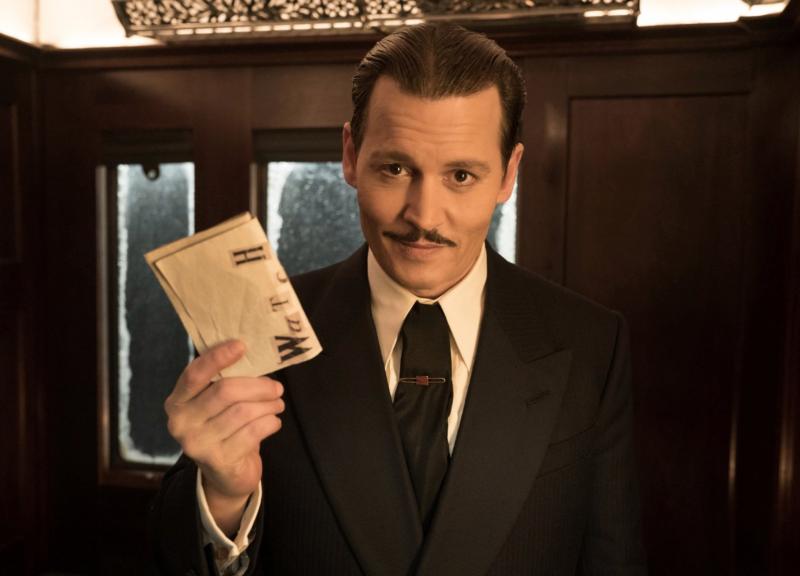‘Murder on Orient Express’ an uninteresting train wreck
The question of the latest adaptation of Agatha Christie's 1934 novel "Murder on the Orient Express" is not so much "whodunit" but "whydunit"?
Hercule Poirot, the persnickety detective at the lead of a series of Christie's novels, has been cracking intercontinental cases for years on screens big and small, including the acclaimed, Oscar-winning 1974 Sidney Lumet adaptation. He is perhaps best immortalized by a series of films in the early '80s, when he was played by a giddy Peter Ustinov, and on TV in the series "Poirot" by David Suchet.
Both actors left indelible prints on the role, so when acclaimed actor/director Kenneth Branagh announced he was crafting a big-budget, star-studded adaptation of the film, it seemed he might have new cars to hook up to this well-traveled train.
Branagh has sculpted himself a rather marvelous patch of fuzz under his nose for the role, but follicular flattery aside, I'm curious as to his reasons for remaking this already-acclaimed tale.
He has certainly amassed first-class passengers for this outing: Michelle Pfeiffer, Johnny Depp, Willem Dafoe, Penelope Cruz and Dame Judi Dench are all along for the ride.
In this adaptation, Poirot is provided a romantic backstory (of sorts) and Branagh occasionally turns him into a bit of a rugged action hero. The facts aboard the "Express" are relatively unchanged: Poirot hops on a luxurious train with a host of dignitaries, including a rugged and ruthless American businessman (played by Depp) who is murdered when the train gets derailed due to an avalanche.
Poirot, who was merely on board to go home, is dispatched to help solve the crime and soon discovers that the murdered man was responsible for the abduction and killing of a little girl, and just about every passenger has some sort of tie to the former case and has covered up their identity when questioned by the esteemed detective.
The trouble with this adaptation is that we really don't get to know any of the suspects. Instead, we are forced to focus on Branagh and Branagh alone, as he keeps himself center frame throughout. Thus, we are given only glimpses of such esteemed talents as Derek Jacobi, Cruz, Dench, Dafoe and others.
The sets are finely polished, and the train on which they are traveling has never looked better. But when it comes to establishing a lineup of characters from which the audience has to choose (which is always three-fourths of the fun in a mystery such as this), Branagh does little to help us invest (one couple who seems to have a large incentive to see the man dead is given about three total minutes of screentime).
And while there are a few moments devoted to the actual avalanche that temporarily derails the locomotive, the majority of the action is left inside the cars as Poirot paces back and forth in search of the suspect. It's a rather lifeless endeavor when it comes to sparking interest for viewers.
"Murder on the Orient Express" is distinguishable for the mere fact that it it can make a train wreck uninteresting to witness.
The Cube at Movies at Midway
For years, in order to check out blockbusters in the mind-melting, seat-rattling theatrical formats, those along the coast would have trek up north to the IMAX in Wilmington or head south to Salisbury for the RPX theater.
But on Monday, Nov. 13, The Movies at Midway unveiled The Cube, the first large-format theater of its kind in the area, boasting luxury seating, laser projection and Dolby Atmos via 51 speakers located throughout the walls and ceiling.
Movies at Midway Assistant Manager Joy Stephenson took an audience of theater employees, families and friends on a test drive of the new facility on Monday.
"We are all incredibly excited to be opening The Cube, Southern Delaware's first premium large-format theater," she announced next to an oversized prop of Thor's hammer on the floor of the new theater.
And large-format it is. The screen is a sprawling 24-foot-high by 58-foot-wide silver beast that captures the new laser projector capable of carrying with it a higher frame rate. For non-movie nerds, the average film is screened at a frame rate of 24 frames per second, and the Cube doubles that, which leads to a more natural flow of images on the screen (it is even higher on features filmed in 3-D).
Stephenson then demonstrated the Dolby Atmos sound system that reverberated through the theater and seats. "That was bumpy!" exclaimed a young audience member after the short demo.
The theater then treated guests to a screening of "Thor: Ragnarok," as the audience nestled into their luxury recliners.
"We are only the second theater on the entire Delmarva Peninsula to offer Dolby Atmos," Stephenson said. And even though "Thor" was featured in 7.1 surround, the new speaker system enveloped the audience as it rumbled through the 51 speakers throughout the 199-seat theater.
Stephenson said the new luxury theater experience will cost $12 for daytime screenings of 2D features, $15 for 3D, while evening shows will be $15 for 2D and $18 for 3D. Seniors and children will get matinee pricing all day.
The Cube will open in time for one of the season's most anticipated big films, "Justice League," which debuts this weekend, followed by the highly anticipated "Star Wars: The Last Jedi."
The theatrical force is strong with this one.

























































